8 Tips for Designing the Ultimate Kids’ Bedroom
by Jess Hodges, Interior Design Manager
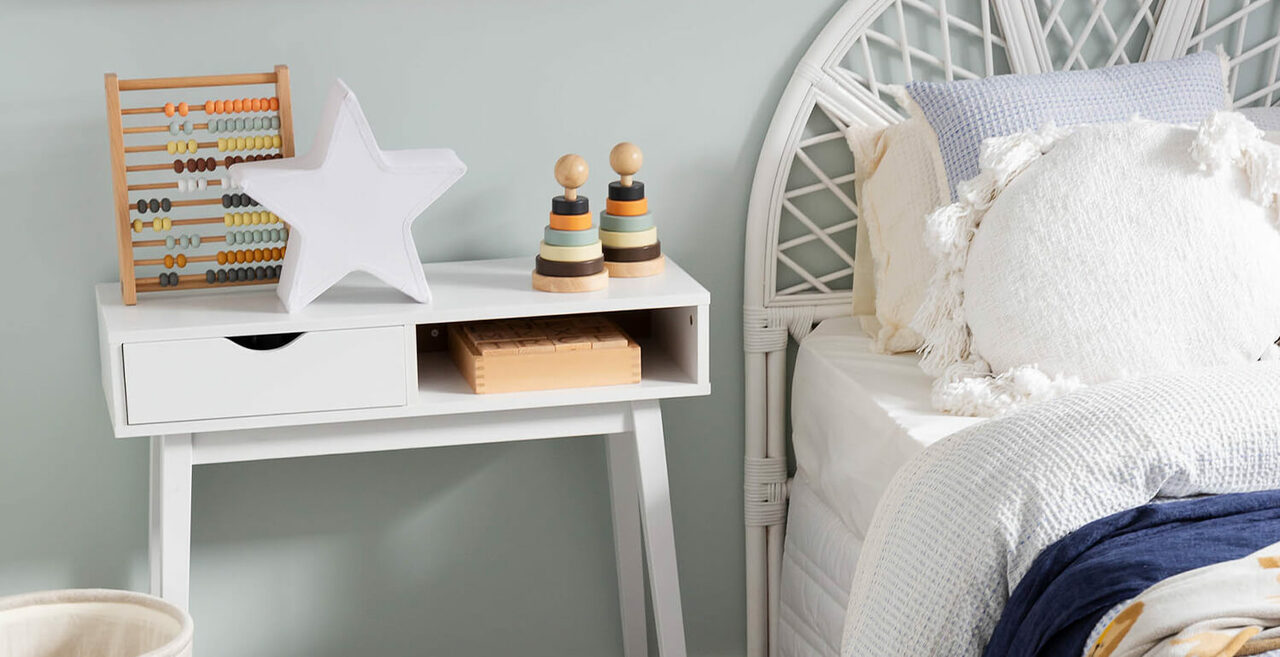
Create a practical and personality-filled kids’ bedroom with these simple steps.
If you’re a parent, one of the most exciting parts of moving into a new home is the chance to decorate your child’s room. It’s the perfect excuse to step out of your comfort zone and have fun with colour, texture and pattern – all while creating a space that your little one will love spending time in.
Is a new kid’s room scheme on the cards? Read on to learn our interior designers’ expert styling and shopping tips for creating a bedroom that’s both practical and personality-filled.
1. Consider their needs
Kids’ rooms often need to multitask as spaces to sleep, play and study… and then there are their mountains of clothes and toys. If that’s the case with your child, plan out the space well before you decorate.
The beauty of building a new home with Carlisle is that you can specify a layout that best suits your family’s needs. A new build gives you the freedom to create separate zones for your child; a desk and chair for homework or art (with good task lighting so they don’t strain their eyes); a couple of comfy floor cushions or bean bags for hanging out with friends; a bed area; a storage area; and a quiet spot such as an armchair or window seat for reading or daydreaming. Learn more on how to create the perfect kids’ study nook here.
If your child is still at an age where they’re racing cars along the floor or lining up their toy ponies on the rug, make sure you leave sufficient open floor space and lay a soft rug on top to make playtime more comfortable.
2. Make room for magic
Let your child’s imagination run wild by sprinkling a little magic into their room decor. Add a fabric teepee in the corner of the room and fill it with cushions to create a cosy spot for reading or colouring, create a cool bed alcove, or paint a wall in chalkboard paint so they can unleash their creativity on the walls. You could even hang an indoor swing or install an indoor rock-climbing wall. The only limit is your imagination!
Infusing fun into your kids’ room is essential, but making it feel magical is just as important! Consider creating a theme for the space – think fairy-inspired or jungle-themed – and include an array of fun motifs that will transport your little one to another world, like soft toys, colourful circus flags or adorable stars. Bring the space to life at lights-out by hanging twinkling fairy lights around the room or decorating surfaces with glow in the dark stickers (a great way to encourage bed time too).
3. Involve your child
Your child is far more likely to get excited about their new room if they’re part of the process. Incorporate their favourite colours into the scheme (if these aren’t quite to your taste, consider incorporating them in pieces you can easily swap out down the track, such as bedlinen and posters), and create areas where they can display their favourite collectibles, such as a floating shelf or a window sill, and a peg board for birthday party invitations and school notes.
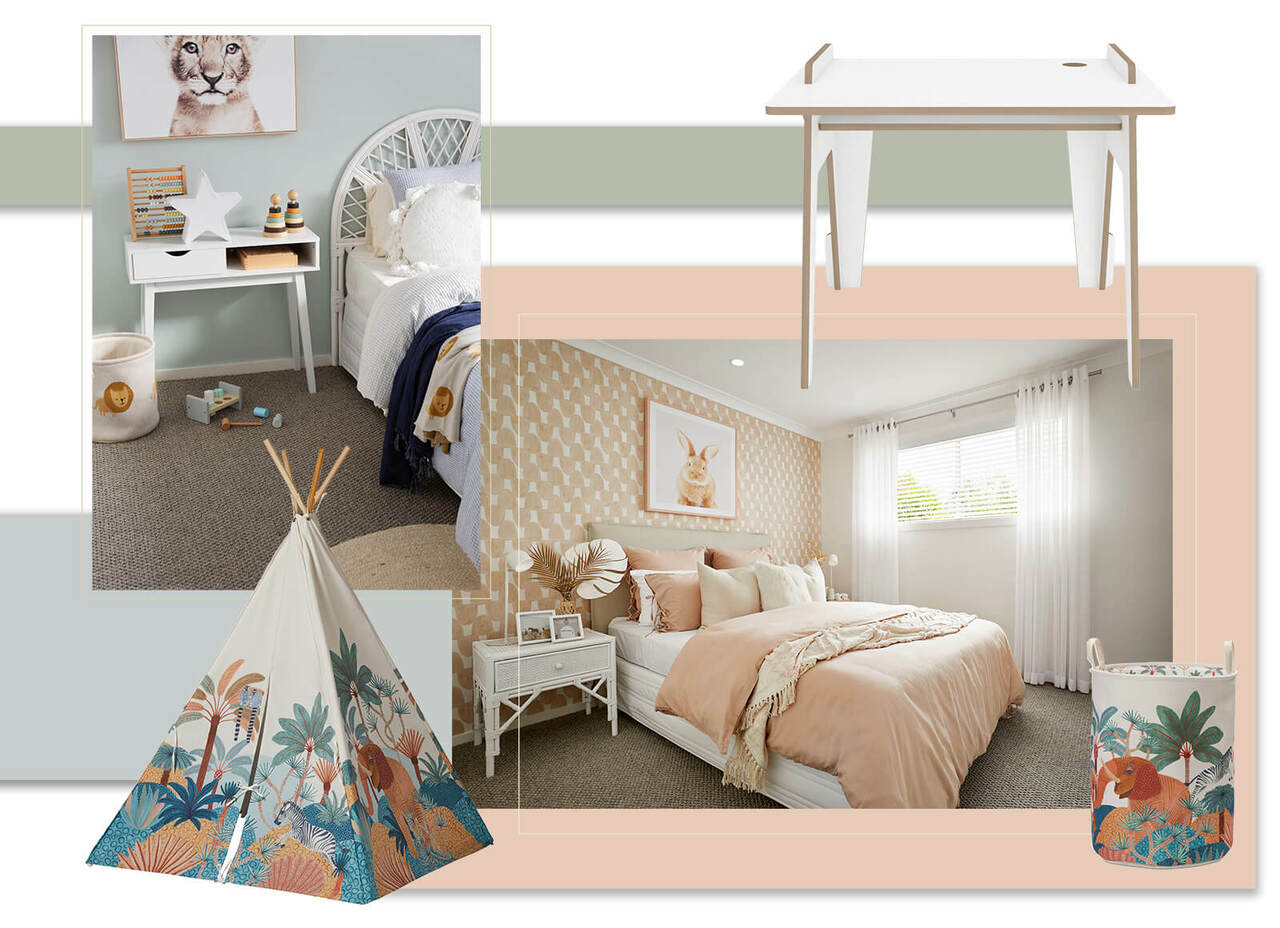
When it comes to designing your kid’s room, the only limit is your imagination! Consider creating a theme for the space – think fairy-inspired or jungle-themed – and include an array of fun motifs that will transport your little one to another world.
4. Have fun with colour & pattern
There are plenty of easy ways you can incorporate bright and cheery colours into your child’s room. Consider an upholstered bedhead in a rich-toned velvet or curtains in a bold pattern; bring the walls alive with prints, vintage posters, woven wall hangings or your little one’s own masterpieces; paint a mural or, for something less permanent, add a removable wall sticker. Or make a statement with a fabulous, statement wallpaper behind the bed… or even on the ceiling!
5. Create a peaceful retreat
When you’re a parent, getting a decent night’s sleep can feel like a true blessing. The first step to recapturing your precious rest is to establish sleep-inducing conditions in your little one’s room. Set the scene for slumber by insulating the room so it remains a comfortable temperature all night long. If the noise from older children in your household or the television next door is a concern, consider upgrading to acoustic insulation to keep the room quiet. Insulation is one of those things you’ll need to specify to your new home before it’s built. Learn about the insulation options available at Carlisle Homes in our stories here and here.
Next up, appropriate window treatments; think blockout blinds or a layered curtain treatment with a pelmet that prevents every bit of light from seeping in.
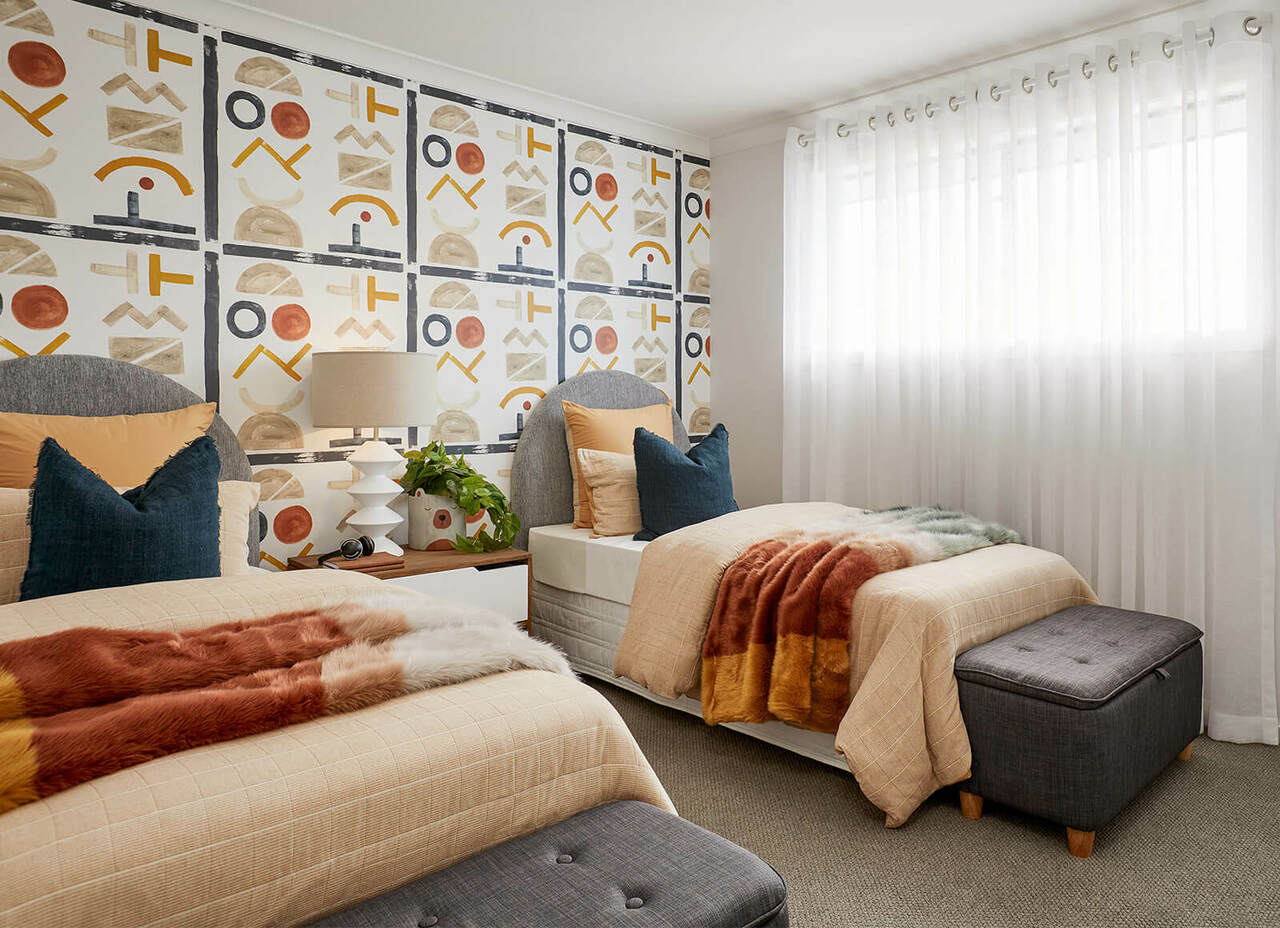
Your child’s room should feel playful and warm. Introduce a statement wallpaper in bright and cheery colours, along with characterful décor and a touch of greenery! Featured here: Cottesloe, Minta Estate, Berwick.
6. Encourage bedtime
Ensure your little one enjoys spending time in their bed by making it as snuggly and appealing as possible. Cue bunk beds! Bunk beds have long been considered a child’s dream and are a superb way to maximise space and make bedtime fun for your kids.
Opt for good quality sheets, pillows and duvets in natural, breathable materials, and layer the bed with a throw, cushions and their favourite cuddly toys.
When it comes to winddown time, a bedside table that has space for a few books is a handy addition; and investing in a nightlight will make your child feel safe if they wake up in the night.
7. Think durability and practicality
When it comes to the big-ticket items in your child’s room, such as beds and rugs, choose pieces that will see them through childhood so you don’t have to replace them every couple of years. It’s worth paying more for well-made styles in durable materials that will survive the odd bump or stain.
The bed, in particular, is worth getting right as it affects the quality of your child’s sleep. Choose a good, supportive mattress and a sturdy bed base (with a trundle if sleepovers are on the horizon).
Neutral and timeless colours, such as white, warm cream and pale grey, are a safe bet for walls, while forgiving tones of sand, mid-grey and grey-brown will help conceal dust and marks. You can then look to add colour and pattern through bedlinen, art and accessories.
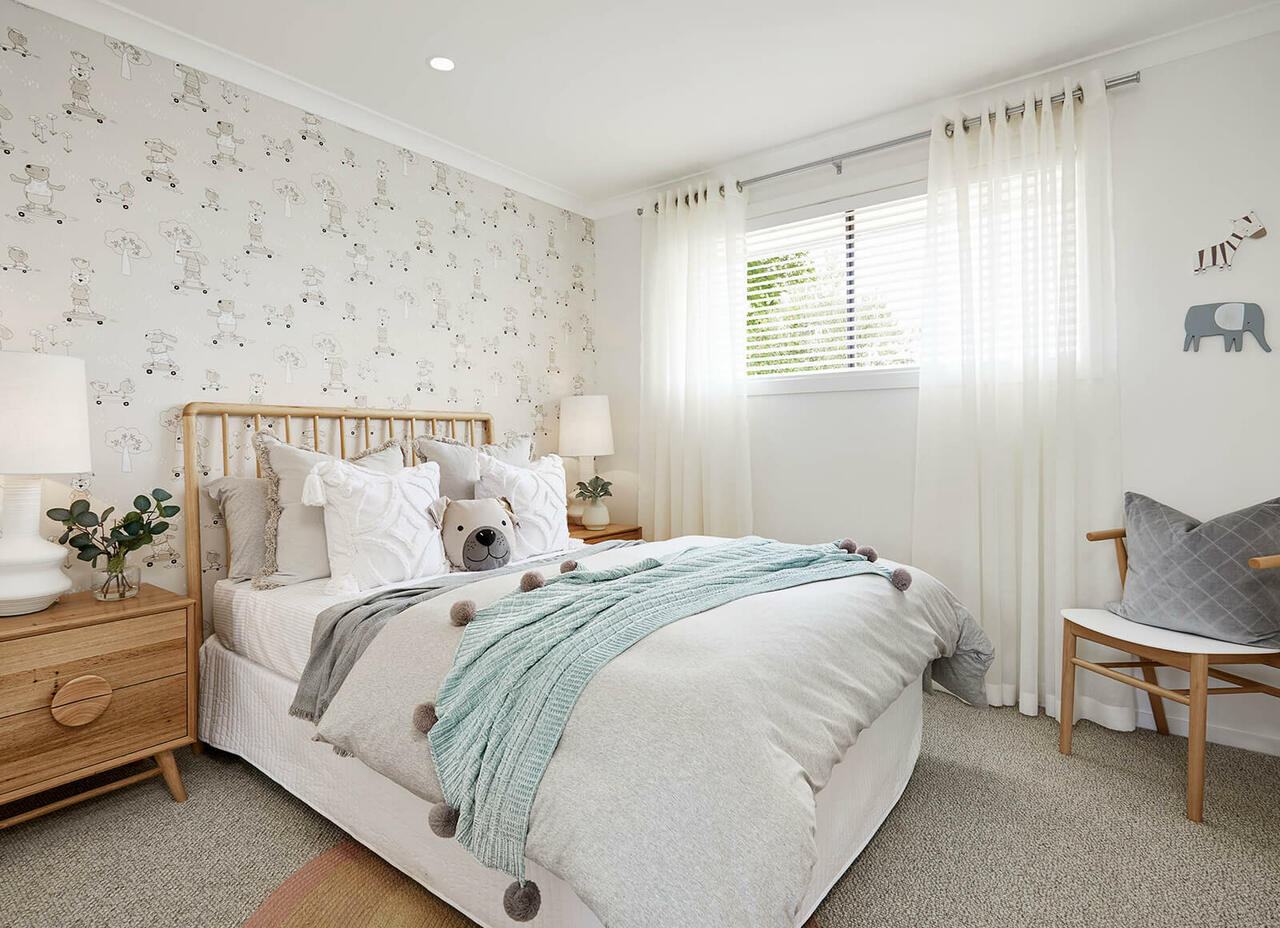
When setting up your child’s bedroom make sure you get the foundations right. Well-made styles in durable materials will withstand the test of time and save you from having to replace the furniture every few years. Featured here: Highview, Woodlea Estate, Aintree.
8. Be smart when it comes to storage
Good storage is a must if you want your child to keep their room tidy (or at the very least, tidy-ish).
A wall of built-in storage is a smart, long-term investment as it maximises the use of space and, if designed well, will last well into your child’s teenage years. Specify a mix of open and closed storage so it’s easy to keep clutter hidden away. If space in your child’s room is tight, consider specifying built-ins after move in that incorporate a desk or daybed – this will instantly free up space elsewhere.
Alternatively, opt for freestanding shelves (attached securely to the wall so there’s no risk of them toppling over), a storage ottoman that doubles as seating, lidded boxes on castors that roll under the bed, wall hooks, wall-hugging book rails, and baskets for hair accessories and small toys. Discover more clever storage solutions for your home here.
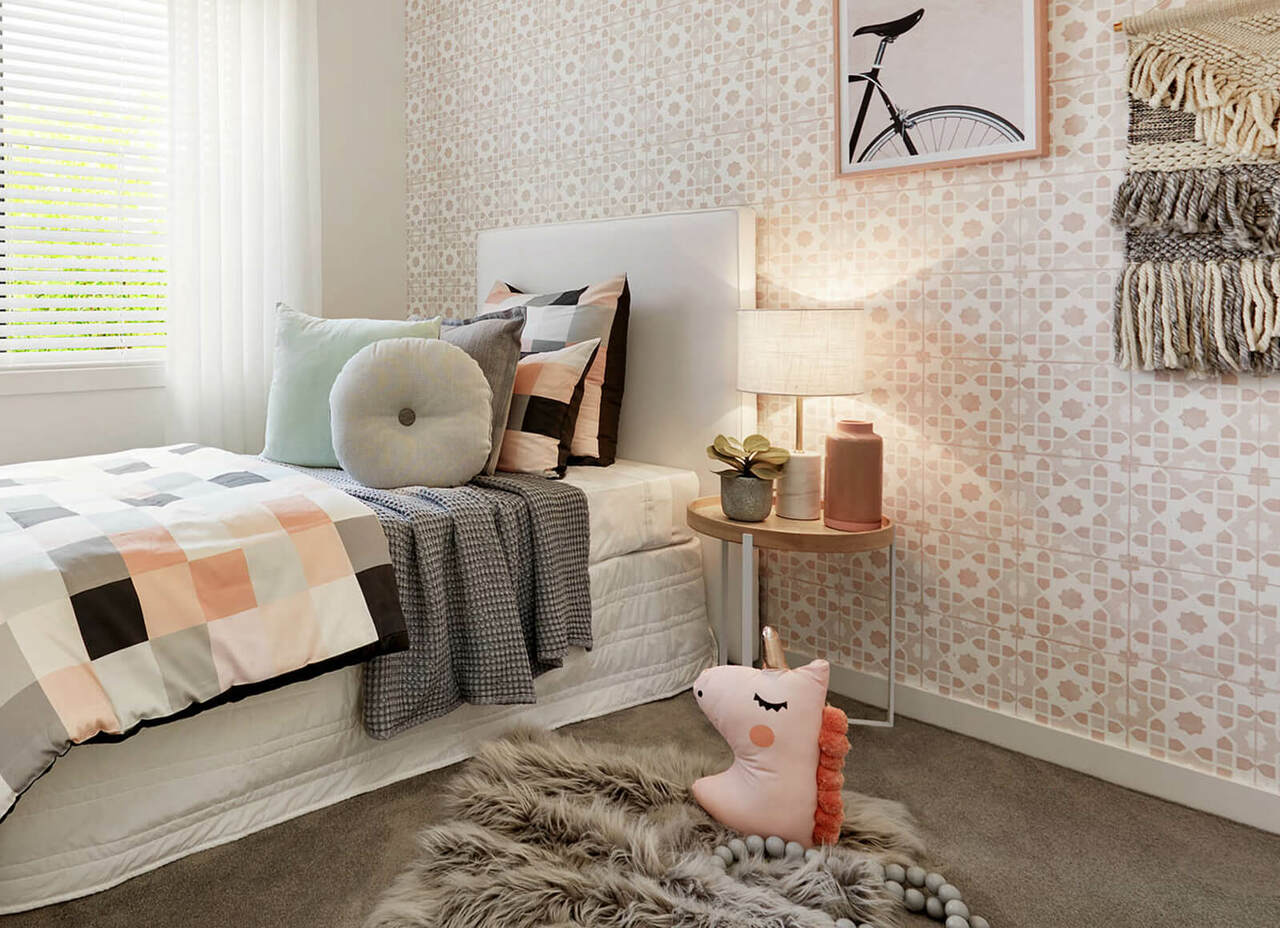
Create an oh-so-snug space for your little one with quality sheets in breathable materials and a bedside table that leaves space for books or a nightlight. Don’t forget their favourite toys and a selection of textured accents like a geometric blanket or mohair rug. Featured here: Coventry, Highlands Estate, Craigieburn.
Looking for ideas for your little one’s room? Take a virtual tour of one (or more) of our 70 display homes, where our expert interior designers have created inspiring fun and spaces to appeal to kids of all ages.

Jess Hodges
Interior Design Manager
Jess' eye for design and versatile skill set have led to multiple industry award wins for Carlisle Homes, showcasing her ability to deliver high quality and tailored interior solutions.
Learn more about Jess Hodges